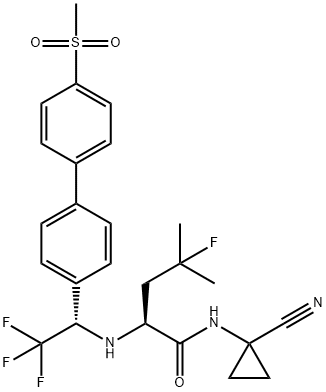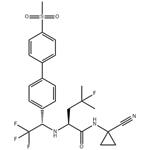Bioactivity
Odanacatib (MK-0822) is an effective and selective neutral inhibitor for cathepsin K(human /rabbit) and IC50 is 0.2 nM/1 nM. It has high selectivity for off-target cathepsin B, L, S. Phase 3。
In vitro
In vitro, Odanacatib acts on cathepsin K with high inhibitory activity and selectivity with IC50 of 0.2 nM and 1 nM when it acts on cathepsin K of human and rabbits. Odanacatib is also effective in all human enzyme experiments with IC50 of 5 nM.
In vivo
With a dosage of 10 mg/kg acting on preclinical rats, Odanacatib has good pharmacokinetic characteristics such as scavenging activity(Cl: 2 mL kg-1 min-1), low distribution (Vdss: 1.1 L kg-1), half-life(T1/2: 6 h) and Orally bioavailable (F: 8%).In addition, Odanacatib has a good metabolic stability if it acts on the Parental rats with 96% recovery of live. With the dosage of 9 µM, Odanacatib can significantly Increase the Proximal femur bone mineral density (BMD) (7.8%), femoral neck BMD (10.8%) and thighs greater trochanter BMD (6.5%). Long-term treatment with Odanacatib on skeletal matured macaque which is lack of estrogen can efficiently inhibit the bone metabolism, and will not reduce the number of osteoclast. It can also maintain the biomechanics properties of nonhuman primates with Ovary resection (OVX).
Features
Odanacatibis an effective and selective neutral inhibitor for cathepsin K
Uses
MK-0822 is a newly developed bone-targeting dual action pro-drug for osteoporosis and bone metastasis. It is also an inhibitor of cathepsin K, an enzyme involved in bone resorption.
Biological Activity
odanacatib (mk-0822) is a potent, orally active and selective inhibitor of cathepsin k with ic50 value of 0.20 nm [1],cathepsin k is expressed predominantly in osteoclasts and degrades the collagen matrix componentsofbone. it plays a central role in mediating bone resorption. and the inhibitor of cathepsin k, odanacatib, is in development for the treatment of osteoporosis. based on preclinical evidence and available clinical data from dose-ranging phase iib trials, odanacatib appears to reduce bone resorptionwhile somewhat preserving bone formation in postmenopausalwomen. currently, odanacatib is undergoing evaluation for fracture risk reduction in a phase iii trial with >16000 patients with postmenopausal osteoporosis [2].chantal mahon, anish mehta, kate mostoller, stefan zajic, denise morris, jessie lee, and s. aubrey stoch. odanacatib, a selective cathepsin k inhibitor, demonstrates comparable pharmacodynamics and pharmacokinetics in older men and postmenopausal women. endocrine research. 2014, 99(2):552–560.
Enzyme inhibitor
This investigational osteoporosis/bone-metastasis drug (FW = 525.56 g/mol; CAS 603139-19-1), also known by the code name MK-0822 and its systematic name N-(1-cyanocyclopropyl)-4-fluoro-N2-{(1S)-2,2,2-trifluoro- 1-[4'-(methylsulfonyl)biphenyl-4-yl]ethyl}-L-leucinamide, targets the cathepsin K, a unique collagenolytic lysosomal cysteine protease that is secreted, thereby facilitating bone resorption by cleaving type-1 collagen under acidic pH. Cathepsin K exhibits a unique cleavage pattern of type I collagen molecules that is fundamentally different from that of other endogenous collagenases. Women receiving ODN (10-50 mg) for 5 years had gains in spine and hip bone mineral density (BMD), showing larger reductions in bone resorption than bone formation markers. Significantly, discontinuation of ODN resulted in reversal of treatment effects. An odanacatib synthesis, which describes a novel stereospecific SN2 triflate displacement of a chiral a-trifluoromethylbenzyl triflate with (S)-g-fluoroleucine ethyl ester, achieves a 61% overall yield in 6 steps.
References
[1] s. aubrey stoch, stefan zajic, julie a. stone, deborah l. miller, lucas van bortel, kenneth c. lasseter, barnali pramanik, caroline cilissen, qi liu, lida liu, boyd b. scott, deborah panebianco, yu ding, keith gottesdiener & john a. wagner. odanacatib, a selective cathepsin k inhibitor to treat osteoporosis: safety, tolerability, pharmacokinetics and pharmacodynamics –results from single oral dose studies in healthy volunteers. british journal of clinical pharmacology. 2012, 75, (5): 1240-1254.
[2] matt s. anderson, isaias noel gendrano, chengcheng liu, steven jeffers,




